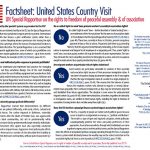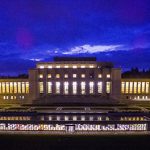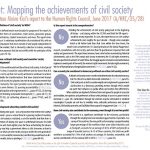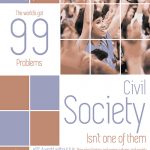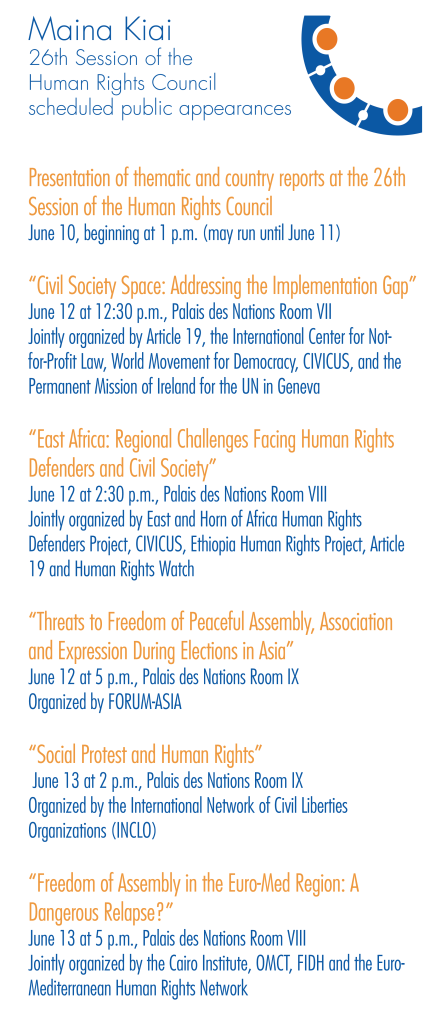 GENEVA – United Nations Special Rapporteur Maina Kiai will appear before the 26th Session of the UN Human Rights Council on June 10 to present his latest reports – one on his official mission to Rwanda and another focusing on the assembly and association rights of marginalized groups.
GENEVA – United Nations Special Rapporteur Maina Kiai will appear before the 26th Session of the UN Human Rights Council on June 10 to present his latest reports – one on his official mission to Rwanda and another focusing on the assembly and association rights of marginalized groups.
He will also present a third report on observations on communications transmitted to Governments and replies received between March 1, 2013, and February 28, 2014.
Kiai, who is the UN Special Rapporteur on the rights to freedom of peaceful assembly and of association, is scheduled to present at the Council’s afternoon session on June 10, which begins at 12:30 p.m. local time; his presentation may run into June 11, depending on the length of other agenda items. The session will be broadcast live on http://webtv.un.org/.
Thematic Report: Groups Most At Risk
Kiai’s thematic report documents the challenges faced by marginalized groups in exercising – or seeking to exercise – their rights to freedoms of peaceful assembly and of association. These groups, deemed “most at risk,” include persons with disabilities; youth; women; lesbian, gay, bisexual, transgender and intersex (LGBTI) people; members of minority groups; indigenous peoples; internally displaced persons; and non-nationals, including refugees, asylum seekers and migrant workers.
“International human rights law is clear in its prohibition of discrimination,” Kiai said. “Human rights cannot be parceled out on the basis of skin color, language, age, gender, sexual identity or any other artificial marker. We possess human rights by virtue of our humanity, not by our membership in a particular group.”
Despite the universality of human rights, Kiai’s report documents numerous examples where assembly and association rights have been unduly limited for particular groups.
In Malaysia, for example, people under 21 are prohibited from organizing a peaceful public demonstration. Children below age 15 cannot even participate. A number of UN Member States explicitly divest non-citizens of their assembly and association rights, including Myanmar, where the stateless Rohingya – who some claim have been present in the country for centuries – have seen such rights entirely eliminated under the constitution.
The assembly and association rights of minorities and indigenous peoples are frequently targeted, such as in Canada, where the government formed a special intelligence unit between 2007 and 2010 to spy on First Nations groups engaging in protest activities. LGBTI individuals have also faced a wave of severe repression in recent years, particularly in Eastern Europe, the Middle East and Africa. In Nigeria, for example, it is a criminal offense to register, operate, participate in or support “gay clubs, societies, organizations, processions or meetings.”
Kiai noted that some restrictions on marginalized groups actually have the support of the wider population, partially because people tend to fear or disregard those who are different from them. This fear is misguided, he said, because governments can manipulate it to their own ends.
“The ‘us vs. them’ rhetoric is an illusion,” Kiai said. “A government that can silence one group is a government that can silence anyone.”
The report contains a long list of recommendations, and calls upon States to “ensure that no individual belonging to a group most at risk is criminalized for exercising his/her rights to freedom of peaceful assembly and of association, nor is subject to threats or use of violence, harassment, persecution, intimidation or reprisals.”
The report is available at freeassembly.net, Kiai’s website for the Special Rapporteur mandate, and on the official OHCHR website for the mandate. The report’s UN document number is A/HRC/26/29.
This is Kiai’s third thematic report to the Human Rights Council since he took up his functions as Special Rapporteur in May 2011.
Country Report: Rwanda
Maina Kiai will also present a report on his January 20-27, 2014, official visit to Rwanda. During his time in Rwanda, Kiai met with government officials, members of civil society and other stakeholders.
The report will assess the current state of the rights to freedom of peaceful assembly and of association in the country, and identify the challenges to fulfilling these rights.
Following his visit in January, Kiai noted the “remarkable progress” that Rwanda had made in “developing infrastructure, building institutions and ensuring stability and security over the past 20 years.” But he noted that assembly and association rights had not developed along the same positive trajectory.
For example, he found that peaceful protests criticizing government policies were generally not allowed, despite the right to peaceful assembly being guaranteed under the constitution. He also documented serious impediments to freedom of association, including onerous obstacles to registration, limits on civil society’s freedom to operate in certain fields, and government interference in the internal affairs of groups deemed too critical of official policy.
The independent expert drew attention to the “striking difference between the registration process for NGOs and businesses.” Civil society groups can take months to register, while businesses can be formed in six hours or less.
The Special Rapporteur also observed “a lack of space” for individuals to express dissenting views in the political realm, due to the Government favouring a type of “consensus politics” that strongly discourages public criticism. Registration of political parties, he said, is also “long, laborious and, in far too many instances, arbitrary.” The Green Party, for example, spent four years securing its registration. Other key opposition parties remain unregistered.
“The rights to freedom of peaceful assembly and of association should not be seen as driving conflict or division,” Kiai said. “Rather, they should be seen as alleviating it. There is value in expressing disagreement and differences peacefully and publicly.”
Kiai’s report on Rwanda is not yet publicly available, but his statement following the visit is available here. The report, together with the comments from the Government of Rwanda, will be uploaded at freeassembly.net and the OHCHR website when it is released. The report’s UN document number is A/HRC/26/29/Add.2.
Rwanda was Kiai’s third official country visit since he took up his functions as Special Rapporteur in May 2011. He has also visited Georgia (2012) and the United Kingdom (2013).
Observations Report and Side-Events at the 26th Session of the Human Rights Council
The Special Rapporteur will also present a report on observations on communications transmitted to governments and replies received between March 1, 2013, and February 28, 2014.
While in Geneva, Maina Kiai will also participate in a number of side-events, including:
- • “Civil Society Space: Addressing the Implementation Gap,” on June 12 at 12:30 p.m., Palais des Nations Room VII (jointly organized by Article 19, the International Center for Not-for-Profit Law, World Movement for Democracy, CIVICUS, and the Permanent Mission of Ireland for the UN in Geneva)
- • “East Africa: Regional Challenges Facing Human Rights Defenders and Civil Society,” on June 12 at 2:30 p.m., Palais des Nations Room VIII (jointly organized by East and Horn of Africa Human Rights Defenders Project, CIVICUS, Ethiopia Human Rights Project, Article 19 and Human Rights Watch)
- • “Threats to Freedom of Peaceful Assembly, Association and Expression During Elections in Asia,” on June 12 at 5 p.m., Palais des Nations Room IX (organized by FORUM-ASIA)
- • “Social Protest and Human Rights,” on June 13 at 2 p.m., Palais des Nations Room IX (organized by the International Network of Civil Liberties Organizations, INCLO)
- • “Freedom of Assembly in the Euro-Med Region: A Dangerous Relapse?” on June 13 at 5 p.m., Palais des Nations Room VIII (jointly organized by the Cairo Institute, OMCT, FIDH and the Euro-Mediterranean Human Rights Network)
(Events list is tentative and subject to change)
For a PDF version of this press release, please click here.

 Tweet
Tweet
 Facebook
(0)
Facebook
(0) 